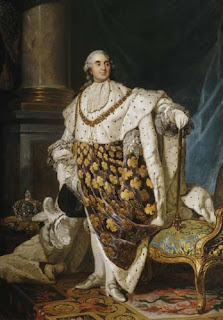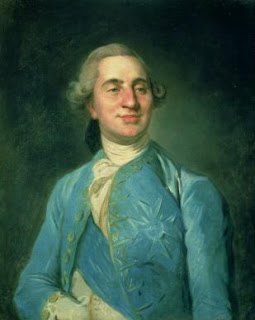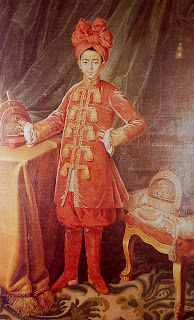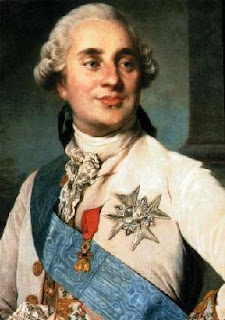The Greatness of King Louis XVI - An Interesting Look
While piling through the blogs I normally read, I came across this 'The Greatness of King Louis XVI' from the Mad Monarchist Blog.
The Greatness of King Louis XVI
Once again, on this day we remember the impious and treasonous regicide of the royal martyr His Most Christian Majesty King Louis XVI of France and Navarre, lastly King of the French. Much can and has been said about the spiritual greatness of this late sovereign. At a time when moral decay had taken its toll on France, and nowhere more so than the court it often seemed, King Louis XVI was a man of devout faith. He never took a mistress, never shirked his religious duties, genuinely preferred work to frivolous parties and truly saw his kingship as a sacred duty rather than an opportunity to have the best for himself. All of that is well established and should be well known. However, even those who praise King Louis XVI for his pious spirit often portray him as rather lacking in the more secular qualities most often required of kingship. At times he is contrasted with King Louis XIV who, while certainly far from being a pious man, was a more decisive leader who steered the ship of state with a firm hand, bringing glory to France and around whom almost all the affairs of Europe revolved. The exact opposite of Louis XVI we are to believe. Yet, while it is true that the two men were very different, it is certainly not true that King Louis XVI occupied himself only with other-worldly matters.
It is tragic any time a nation sets to destroying itself rather than accomplishing the great deeds possible if they worked together to channel all of that energy into the pursuit of some more lofty ambition. Although he had trepidations about some of it, there is ample reason to believe that had it not been for the outbreak of the Revolution, King Louis XVI might have gone down in history as one of the greatest Kings of France in secular as well as spiritual terms. In all the focus on the Revolution and his personal character, the great events and foreign policies of his reign are often overlooked. In the first place, he was no despot and from the very start favored giving the people a greater say in how their money was spent and how France was governed. However, even with all of the problems facing France, as a monarch, Louis XVI took a broader look at the past, present and future of France and wanted to see past losses made right and gains made for a greater future for his country. Of course, particularly after the drubbing France had taken in the recent conflicts with Great Britain, it was the British who would be the primary rival in his foreign policy. The King was not malicious or reckless by any means but he was determined to see British gains made at the expense of France reversed.
This was what ultimately led to the French intervention in the American Revolution (or more properly War for Independence). Louis XVI had deep reservations about helping any rebels in waging war against their sovereign yet he was persuaded to make an alliance with the fledgling United States by a combination of the urging of his advisors and his desire to see an end to the British domination of North America and, perhaps, a much greater French influence in the region. Although not often remembered, following the French and Indian War the French military had been reformed and greatly improved. The expeditionary force sent to North America fought extremely well and, along with the French navy, proved decisive in securing the independence of the United States by forcing Great Britain to give up on the war and come to terms with their former fellow subjects. The islands of Tobago and Grenada were taken from the British (Tobago being retained by France along with Senegal in the final settlement) but, to some extent, Louis XVI was undercut by his American allies who made a separate peace with Great Britain and effectively thwarted the greatest ambition King Louis had for the conflict which was the recovery of Canada. Had the war gone on there is every reason to believe that could have happened.
In the other great arena of colonial competition, Louis XVI also hoped to reverse previous losses and see the growing British dominance in India come to an end. He allied with the Maratha Empire and took the side of the Sultan of Mysore in the Second Anglo-Mysore War in the hope of breaking the dominance of the British East India Company, curtailing British influence in India and increasing French influence. France actually had a much larger sphere of influence in India, controlling large parts of the east coast and holding sway over the majority of the southern subcontinent. French troops and ships were active in the region but due to the distance involved the campaign was overtaken by events elsewhere and when the end of the American Revolution forced France to make a hasty peace with Britain the previous French support for the Indians was withdrawn. In the end Britain and the Indian forces made peace that restored the pre-war status quo in India. Again, had not the situation in American brought hostilities to an end, it is conceivable that France, working through local alliances, might have dethroned Britain from her place of prominence in India.
There was also the Far East to consider and, though not often remembered, it was under King Louis XVI that France first took a serious interest in Vietnam and, indirectly, helped bring about the victory of the last great imperial dynasty of Vietnamese history. Crown Prince Canh, heir of the future Emperor Gia Long, came to Versailles as a boy, converting to Christianity and symbolizing the alliance by which French support was promised to his father in exchange for favorable trade agreements and some minor territorial concessions. The previous regime in Vietnam had viciously persecuted Christians and King Louis was anxious to see a more humane dynasty put in place. A Catholic missionary had saved the life of Gia Long and he vowed that the rights of Christians would always be respected in his domain. However, by the time these great events were to take place in southeast Asia the forces of the Revolution were gaining strength and events rapidly approached a climax. King Louis was not able to play the decisive role he had wished to. Still, the Bishop of Adran acted on his own to help Emperor Gia Long take the throne and so things worked out. The only problems arose in the future when post-revolutionary French regimes tried to collect the payments promised to Louis XVI which the Vietnamese were reluctant to grant since it was the Bishop rather than the government in Paris which had actually helped them at the critical time.
King Louis also sponsored around-the-world voyages of exploration and the world (certainly North America) owes a great deal to Louis XIV for doing the same in his time. The point of all of this is that King Louis XVI was not, as he is so often portrayed, some sort of totally indecisive ditherer who fussed and prayed over one crisis after another. He had big plans for France, he had ambition, he wanted to see France recover her place of greatness in the world and had a few things gone differently there is no reason to believe that she could not have done so. There are those who will say that the Revolution proves that France was too weak to have accomplished anything in that period but this is clearly false. Look at what Napoleon was able to accomplish, once the Revolution was ended, only a few years later with the same country. Considering that the goals of Louis XVI were all about restoration and not conquering every nation in Europe, there is no reason to believe that he could not have been successful. King Louis XVI fully deserves his pious reputation as a martyr for the Kingdom of France but he should also be remembered as a potentially great King who could have done magnificent things for his country.
From The MadMonarchist.
http://madmonarchist.blogspot.com/2012/01/greatness-of-king-louis-xvi.html
Delos's Say
I know very little aboutauthenticityof these statements, but I have come across, the french intervention in the war ofIndependencemany time. What was stated, is whats generally accepted byscholarsacross the board. In my own research of the economic state of France during the 18th century, it was during the late part of the rule of Louis XV, and into Louis XVI that roads were better maintainedand expanded, and adevelopmentofindustries,slowly started to rise, based on the Industrial Revolution in Britain, which wasbeginning. Louis XVI, unlike his grandfather, took into account his people's views and accounts, issuing a royalcensus, which were still kept to this day, locked away away somewhere inParis.Whetherthecensuswas used or not, the sheereffortto do that, is show that he was more interested in his people a whole, rather than his court.Duringhis years as dauphin, he not only consumed food, dear Louis loved food, but books, upon books. When he came to the throne, scared as he was, he was a promising young monarch, who was full of ideas. His ideas I've read, were met by greatopposition, by his minsters, and by his court, who resisted even the slightest change, and we're obsessed with short term polices. Poor Louis, he wasindecisiveness, a lot, or little, perhaps it was thisopposition, and the pressure of his surroundings, that lead to his choices, and the damper down the initial ideas he once had.
I'll be researching more on the points listed by The Mad Monarchist, its aninterestingthing!







Thanks Seb! Luckily my buddy RL, knows french very well, and he likes history, so he'll give me the summary. As for the rest of the courtiers, there is a lot of french speakers, its also good.
I very much enjoyed reading this posting ~ Thank you for sharing withus here.
Oh merci for sharing with us this wonderful peice on the king who I haven't passed asingle day without remembering him or his beloved wife ( to us all I hope have sorrow for this unfortunate couple)